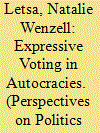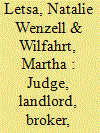| Srl | Item |
| 1 |
ID:
172886


|
|
|
|
|
| Summary/Abstract |
Why do people vote in autocratic elections? Until now, most answers to this question have argued that people vote because they expect a material reward, such as patronage or a direct transfer via vote-buying, or as a way of rewarding the regime for its economic performance. I argue that citizens also vote for different non-economic, expressive reasons, such as a sense of civic duty or a desire to improve the democratic process. I present data from an original quasi-national public-opinion survey conducted in Cameroon, which shows that expressive reasons for voting can explain more variation in voting behavior than economic reasons. These different motivations challenge the implications of existing models of democratization by explaining how some of the poorest electoral autocracies have withstood decades of economic stagnation.
|
|
|
|
|
|
|
|
|
|
|
|
|
|
|
|
| 2 |
ID:
193277


|
|
|
|
|
| Summary/Abstract |
This paper seeks to broaden the framework for understanding the many different roles that traditional leaders play in their communities in sub-Saharan Africa. Using data from an original public opinion survey along the Ghana–Togo border, we find that one of the most important roles of the chieftaincy is to maintain law and order: resolving disputes and keeping the community safe from crime. However, we also find considerable variation in what chiefs are expected to do, how effective they are performing their various tasks, and how much authority they wield in doing so – both over their own subjects as well as over local government officials. We explore several potential sources for this variation, finding that chiefs in Ghana, a former British colony, are expected to do more jobs, are perceived to be more effective, and hold more upward power over local state officials compared with their counterparts in Togo, a former French colony.
|
|
|
|
|
|
|
|
|
|
|
|
|
|
|
|